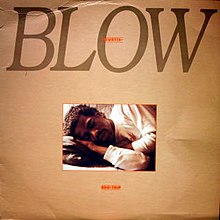Ego Trip is the fifth album by the rapper Kurtis Blow, released in 1984 on Mercury Records.[6][7] The only charting singles were "8 Million Stories", which peaked at 45 on the Hot Black Singles chart, and "Basketball", which peaked at 71 on the Hot 100.
| Ego Trip | ||||
|---|---|---|---|---|
 | ||||
| Studio album by | ||||
| Released | 1984 | |||
| Genre | Hip hop | |||
| Length | 42:48 | |||
| Label | Mercury/Polydor 822 420 | |||
| Producer | J.B. Moore Robert Ford Jr. | |||
| Kurtis Blow chronology | ||||
| ||||
| Singles from Ego Trip | ||||
| ||||
| Review scores | |
|---|---|
| Source | Rating |
| AllMusic | |
| Christgau's Record Guide | B−[2] |
| The Encyclopedia of Popular Music | |
| The Philadelphia Inquirer | |
| The Rolling Stone Album Guide | |
Critical reception
editTrouser Press dubbed Ego Trip one of Blow's "state-of-the-art in an almost mainstream vein" early albums, noting that the inclusion of Run-D.M.C. was a "concerted effort to get hipper."[8] The Washington Post wrote that Blow "knows how to mix plain talk with his rhymes, so that his records carry an extra bit of street feel, but his most impressive moments come when he exploits the studio, as he does on the intoxicatingly sinuous 'AJ Scratch'."[9] The Philadelphia Inquirer wrote that "the hit single 'Eight Million Stories' suggests that other people are worthier subjects of his songwriting than Kurtis Blow."[4]
In a tribute to "Basketball" and its legacy, Slam wrote that "none of the NBA/hip-hop empire building happens—or at the very least none of it happens the way we remember it happening—without the skills of Kurtis Blow."[10]
Track listing
edit- "8 Million Stories" – 8:00 (featuring Run-D.M.C.)
- "AJ Scratch" – 5:48
- "Basketball" – 6:30
- "Under Fire" – 7:23
- "I Can't Take it No More" – 4:14
- "Ego Trip" – 5:34
- "Fallin Back in Love Again" – 5:23
Charts
editWeekly charts
edit| Chart (1984–1985) | Peak position |
|---|---|
| US Billboard 200[11] | 83 |
| US Top R&B/Hip-Hop Albums (Billboard)[12] | 18 |
Year-end charts
edit| Chart (1985) | Position |
|---|---|
| US Top R&B/Hip-Hop Albums (Billboard)[13] | 47 |
References
edit- ^ AllMusic review
- ^ Christgau, Robert (1990). "B". Christgau's Record Guide: The '80s. Pantheon Books. ISBN 0-679-73015-X. Retrieved August 17, 2020 – via robertchristgau.com.
- ^ Larkin, Colin (2006). The Encyclopedia of Popular Music. Vol. 1. MUZE. pp. 692–693.
- ^ a b Tucker, Ken (24 Aug 1984). "ALBUMS". The Philadelphia Inquirer: F26.
- ^ The Rolling Stone Album Guide. Random House. 1992. p. 69.
- ^ "Kurtis Blow | Biography & History". AllMusic.
- ^ Jenkins, Sacha; Wilson, Elliott; Mao, Jeff; Alvarez, Gabe; Rollins, Brent (March 25, 2014). Ego Trip's Book of Rap Lists. St. Martin's Publishing Group. ISBN 9781466866973 – via Google Books.
- ^ "Kurtis Blow". Trouser Press. Retrieved 13 March 2021.
- ^ Considine, J. D. (November 29, 1984). "Hip-Hop to Freshness" – via www.washingtonpost.com.
- ^ "How Kurtis Blow and the Exploding Popularity of the NBA Turned a Generation On To Hip-Hop". SLAM. March 14, 2017.
- ^ "Kurtis Blow Chart History (Billboard 200)". Billboard. Retrieved December 31, 2020.
- ^ "Kurtis Blow Chart History (Top R&B/Hip-Hop Albums)". Billboard. Retrieved December 31, 2020.
- ^ "Top R&B/Hip-Hop Albums – Year-End 1985". Billboard. Retrieved December 31, 2020.